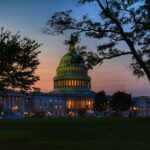Black Conservatism Post-2022 Midterms
During the 2022 midterm season, there were many competing subplots through which pundits have sought to understand the electoral dynamics at play. There was a significant discussion early on in the season about Peter Thiel’s influence through candidates like Blake Masters and J.D. Vance, and what this means for the New Right-wing of the conservative movement. There was the Trump-candidate vs. non-Trump candidate hypothesis that posited that success rose or fell based on the weight of Trump’s fingers on the scale. But of all of these, I think the most interesting is the conversation about increasing diversity in the GOP electorate and candidate class.
Some articles have done deep work on the GOP’s inroads within Hispanic communities broadly. Other articles have broken out the details and disaggregated the broad term “Hispanic” to get specific on what kind of “Hispanic” communities (e.g. in South Florida). Although the results of the midterm didn’t demonstrate an overwhelming tide shift on Hispanic voters everywhere, overall exit polling did indicate that Latina women moved 14 points toward the GOP compared to 2018 and Latino men moved 21 points toward the GOP compared to 2018. Much less, however, has been written on the slowly growing ranks of African-American GOP voters.
That same exit polling indicated that Black women moved toward the GOP 7 points and Black men moved toward the GOP by 11 points since 2018. Black voters are an important demographic for every political movement because they make up significant percentages of the eligible voter populations in key states like Georgia (33%), Louisiana (32%), and Virginia (21%). Even while making up a sizeable amount of the electorate, Republicans have often felt that African-American voters were beyond their reach as a demographic. That analysis does have evidence. Even with those shifts toward the GOP in polling, NBC exit polling only had 13% of Black voters voting for the GOP. While the number for Black men specifically was higher at 17%, chipping further into that 83% for Democrats still may seem like an insurmountable barrier. However, underlying ideological shifts may bode well for the GOP continuing to increase its percentage amongst African-Americans.
In a poll done by Morning Consult examining the ideological shifts of Americans since 2017, they found that a large percentage of African-Americans between the ages of 18-34 have shifted from a majority (54%) identifying as “liberal” to only 32% agreeing with being “slightly liberal,” “liberal,” or “very liberal.” Now a majority identify as either “moderate” (from 24% to 34%) or some form of conservative (from 15% to 18%). Significantly, Afric an-Americans 18-34 were more likely to call themselves moderate than any other population. White voters identified as moderate at 24% and Hispanic at 26%. What does all this say about how the GOP attracts more African-American voters? Moderation.
As it does for many other areas, Florida’s gubernatorial race demonstrates a winning playbook for the GOP on winning non-white voters, especially African-American men. Governor Ron DeSantis was one of, if not the only, candidate that overperformed the national average with Black men in exit polling with about 19% voting for the incumbent. That’s notable considering the significant attention on Gov. DeSantis that has made him an even more polarizing national figure since his first election. Although Gov. DeSantis did not shy away from any hot button social topics, he did present a more competent and conventional profile than some other GOP candidates running throughout the country. Theoretically, with positions like banning “critical race theory” in education, conventional wisdom would assume that he would do much worse, not better, than the average. In a piece for the Heritage Foundation, conservative commentator Delano Squires identifies a cadre of cultural forces, from establishment politicians to media outlets, as being some of the reasons why we don’t actually see more Black men voting for the GOP. Squire believes that the story of America’s oppressive history is utilized to make the Democratic Party seem to be the only non-racist option for African-Americans. Indeed, he goes on to note that the use of the term Jim Crow has expanded in recent years to encompass “James Crow, Esq.,” “Jim Eagle,” and “Jimmy Crow” as terms for the return of early 20th century racist oppression at the hands of Republicans. Famously, Joe Biden told African-Americans that Mitt Romney, of all people, would put the entire African-American demographic “back in chains“.
Squires may be on to something. A Pew Research study found that both Black Democrats and Black Republicans held an almost equally important view of their ancestry as being important, with Black Republicans actually ranking it slightly higher than Black Democrats (66% v. 65% respectively). However, Black Republicans were much less likely to say that racial discrimination is the main reason that Black people can’t get ahead in the U.S. (44% to Black Democrats at 73%). This indicates that Black Republicans don’t think history is any less important than Black Democrats, just that they may weigh the impact of racism on contemporary outcomes differently. This may be in no small part to the messaging that Squires alluded to. This year was a record for the number of Black Republican candidates running, and that may be part of the solution. Historically, Black conservatives like Thomas Sowell and Clarence Thomas spend considerable time addressing these exact concerns and Black GOP candidates like Wesley Hunt have done the same. However, these candidates must be moderate, credible messengers to make the kinds of inroads necessary outside of already significantly red GOP strongholds.




